#Fengshen yanyi
Text
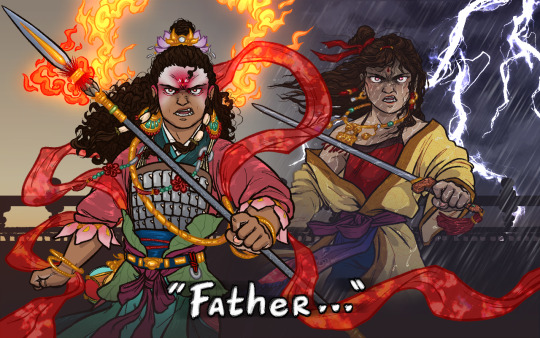
Prodigal son terror
Li Jing in a fury grabbed his halberd, leapt on his horse and galloped out of the headquarters. He was astonished to see Nezha with his Wind-Fire Wheels and Fire-Tipped Spear. He swore loudly, "You damned beast! You caused us endless suffering before your death, and now that you've been reborn, you're troubling us again!"
"Li Jing! I've returned my flesh and bones to you, and there's no longer any relation between us. Why did you smash my golden idol with your whip and burn down my temple? Today I must take my revenge!"
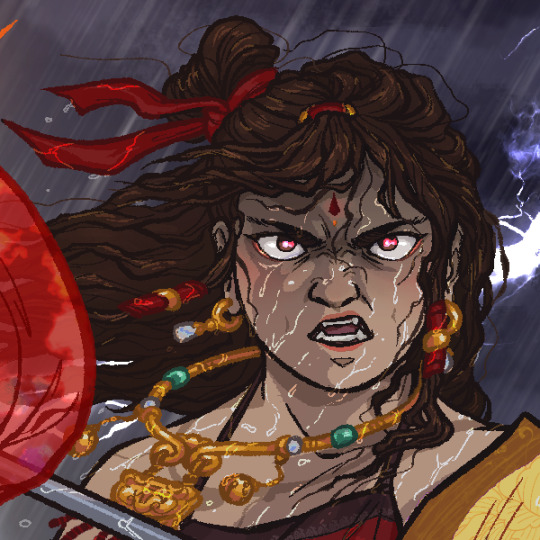

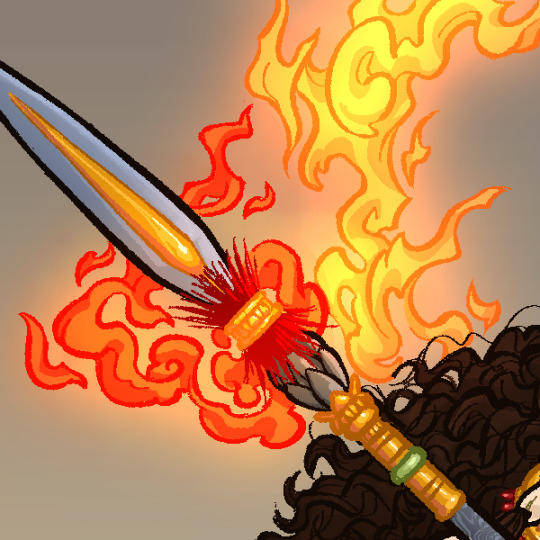

since I'm on a Nezha streak, might as well do my design for him on the Expedition AU! given that i've chosen to give characters a closer likeness to their region, it's only fitting i do the same with import deities like Guanyin, Subodhi and Nezha.
he's a complicated figure to place in the timeline because he gained popularity as a deity much after, only really arriving in China by the time the Journey would have been set. FSYY was written closer to when JTTW was written down, and he was retroactively inserted on the Zhou Dynasty period.
so deciding what to even do with him is dicey. but then i said fuck it, mythological rules apply here, he was around for the events of FSYY, and it and JTTW are set in the same universe. and for the sake of having some fun, i decided to get funky with his concept.
Nezha had the likeness of his family when he was alive, as described in FSYY, but once he was reborn with a lotus body he gained Indian traits instead. this is to be a nod to his status as an import deity and his origin as Nalakubara, and as the centuries roll by he may present himself to mortals closer to the locals' appearance wise.
as for his looks, i drew inspiration from multiple sources. read more for my rambles <3
his armor is closer to reconstructions of Zhou dynasty-period armor, skipping over extra parts simply because his lotus body is so indestructible, there's no need for a full set;
there are two red Chinese knots with jade beads dangling from the armor ties. they are said to ward off evil spirits, which felt like a good fit for a guy known to banish demons. i picked a six-petal flower pattern, which represents reunion, unity and a bright future;
i included lotus petals and leaves on his outfit as they are common in Beijing Opera outfits for him, and his makeup is a call to it as well;
The pink from the cheeks and eyeshadow seeps into his ear shell, as to convey the way sometimes, you get so angry even your ears blush;
Another thing i referenced from Opera is the two red ribbons on his sidelocks, though I changed them to two bulbs of lotus roots;
Four petals drawn close to his urna as both to make it look like a lotus but also form five petals, which is an auspicious number;
His hair crown is a fancy princely [knot] with a lotus motif and a pearl in the center, as he was the Pearl Spirit before becoming Nezha;
I was going to go with elf-like ears but I thought I could do better, so I went for stretched earlobes instead. you can't see it that well but hopefully the very large golden earrings imply it well enough xvx;
His cheek dimples are common sight on religious images of him and it was a cute touch imo;
Younger Nezha wears a golden robe because of his title as General of the Central Altar in Daoist belief, and the center direction is connected to yellow or gold, and yellow robes are usually meant for emperors and their sons, which is a minor nod to his self-assureness and boldness;
The Cosmic Ring has spiralling grooves on it both to catch blades on it for defense but also as a callback to Opera props;
On his waist is the embroidered ball weapon he was attributed with in earlier myths, he was also meant to have the leopard skin bag Taiyi Zhenren gave him, bjt it was going to be obscured by the text so i omitted it;
A few depictions of him gave him a halo of fire, which was real cool so i added it as well.
#fengshen yanyi#investiture of the gods#fsyy#iotg#li nezha#nezha#third lotus prince#third prince nezha#expedition to the west au#bell dragon art
322 notes
·
View notes
Note
I've heard the idea that Monkey is 7 times immortal thrown around a couple times, but my count has only ever gone up to 4 (the peaches, the pills, the wine, and his daoist studies). How immortal IS Monkey?
I count at least six levels of immortality.
1) Daoist Longevity Arts - Ch. 2
I discuss the exact methods here.
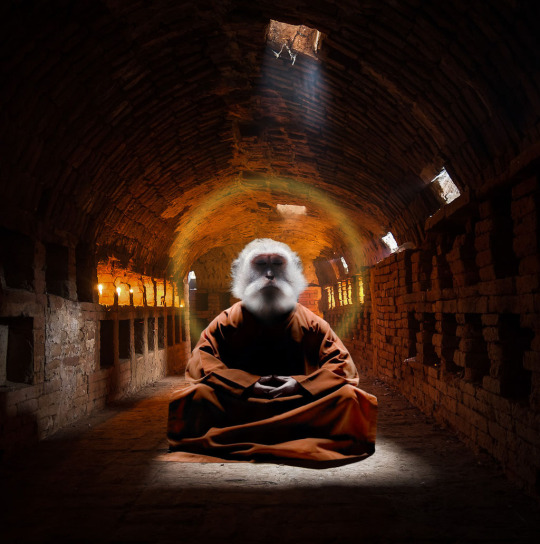
A photomanipulation by me.
2) Erasing Allotted Lifespan - Ch. 3
[After Monkey is summoned to hell in his sleep and thereafter threatens to beat the Judges of Hell for their mistake] The Ten Kings immediately had the judge in charge of the records bring out his [Sun's] books for examination. The judge, who did not dare tarry, hastened into a side room and brought out five or six books of documents and the ledgers on the tens species of living beings ... He [Monkey] had, therefore, a separate ledger, which Wukong examined himself. Under the heading "Soul 1350" he found the name Sun Wukong recorded, with the description: "Heaven-born Stone Monkey. Age: three hundred and forty-two years. A good end."
Wukong said, "I really don't remember my age. All I want is to erase my name. Bring me a brush." The judge hurriedly fetched the brush and soaked it in heavy ink. Wukong took the ledger on monkeys and crossed out all the names he could find in it. Throwing down the ledger, he said, "That ends the account! That ends the account! Now I'm truly not your subject" (Wu & Yu, 2012, vol. 1, pp. 140-141).

A print from the Japanese children book Son Goku (1939).
3) Immortal Peaches - Ch. 5
[After being appointed the guardian of the Queen Mother of the West's immortal peach groves] The Great Sage ... asked the local spirit, "How many trees are there?" "There are three thousand six hundred," said the local spirit. "In the front are one thousand two hundred trees with little flowers and small fruits. These ripen once every three thousand years, and after one taste of them a man will become an immortal enlightened in the Way, with healthy limbs and a lightweight body. In the middle are one thousand two hundred trees of layered flowers and sweet fruits. They ripen once every six thousand years. If a man eats them, he will ascend to Heaven with the mist and never grow old. At the back are one thousand two hundred trees with fruits of purple veins and pale yellow pits. These ripen once every nine thousand years and, if eaten, will make a man's age equal to that of Heaven and Earth, the sun and the moon..."
One day he [Monkey] saw that more than half of the peaches on the branches of the older trees had ripened, and he wanted very much to eat one and sample its novel taste. Closely followed, however, by the local spirit of the garden, the stewards, and the divine attendants of the Equal to Heaven Residence, he found it inconvenient to do so. He therefore devised a plan on the spur of the moment and said to them, "Why don't you all wait for me outside and let me rest a while in this arbor?" The various immortals withdrew accordingly. That Monkey King then took off his cap and robe and climbed up into a big tree. He selected the large peaches that were thoroughly ripened and, plucking many of them, ate to his heart's content right on the branches. Only after he had his fill did he jump down from the tree. Pinning back his cap and donning his robe, he called for his train of followers to return to the residence. After two or three days, he used the same device to steal peaches to gratify himself once again
One day the Lady Queen Mother decided to open wide her treasure chamber and to give a banquet for the Grand Festival of Immortal Peaches, which was to be held in the Palace of the Jasper Pool. She ordered the various Immortal Maidens ... to go with their flower baskets to the Garden of Immortal Peaches and pick the fruits for the festival ... [After meeting with the Great Sage's ministers] The local spirit went into the garden with them; they found their way to the arbor but saw no one. Only the cap and the robe were left in the arbor, but there was no person to be seen. The Great Sage, you see, had played for a while and eaten a number of peaches. He had then changed himself into a figure only two inches high and, perching on the branch of a large tree, had fallen asleep under the cover of thick leaves (Wu & Yu, 2012, vol. 1, pp. 161-162).
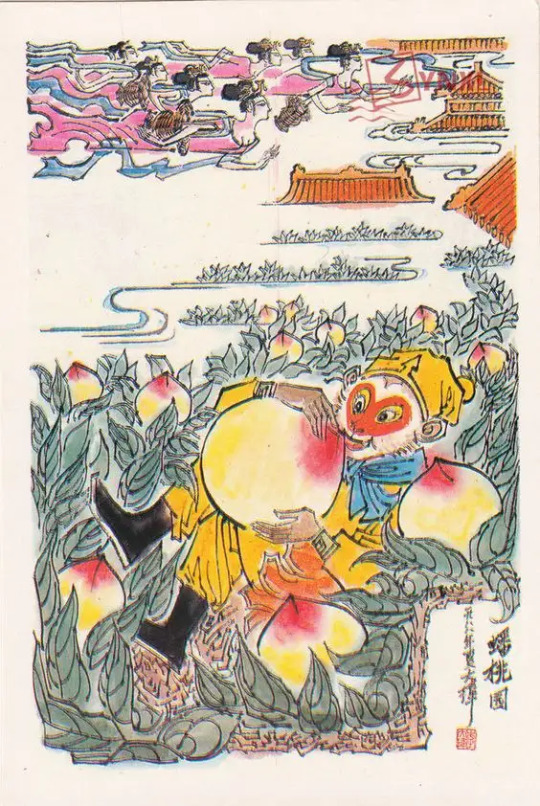
A new years print found online.
4) Immortal Wine - Ch. 5
Our Great Sage could not make an end of staring at the scene [the heavenly feast set for the Immortal Peach Banquet] when he suddenly felt the overpowering aroma of wine ... standing beside the jars and leaning on the barrels, he abandoned himself to drinking. After feasting for a long, he became thoroughly drunk...
[...]
[After returning to Flower Fruit Mountain and meeting with his children, he says] "When I was enjoying myself this morning at the Jasper Pool, I saw many jars and jugs in the corridor full of the juices of jade [yuye qiongjiang, 玉液瓊漿; lit: "Jade liquid and jade syrup"], which you have never savored. Let me go back [to heaven] and steal a few bottles to bring down here. Just drink half a cup, and each of you will live longer without growing old" ... He took two large bottles, one under each arm, and carried two more in his hands. Reversing the direction of his cloud, he returned to the monkeys in the cave. They held their own Festival of Immortal Wine [Xianjiu hui, 仙酒會], with each one drinking a few cups" (Wu & Yu, 2012, vol. 1, pp. 165 and 167).

A screenshot from the 1986 Journey to the West TV show.
5) Immortal Elixir - Ch. 5
[After Sun Wukong drunkenly stumbles into Laozi's laboratory in the Tushita Heaven] He found no one but saw fire burning in an oven beside the hearth, and around the oven were five gourds in which finished elixir was stored. "This thing is the greatest treasure of immortals," said the Great Sage happily. "Since old Monkey has understood the Way and comprehended the mystery of the Internal's identity with the External, I have also wanted to produce some golden elixir on my own to benefit people. While I have been too busy at other times even to think about going home to enjoy myself, good fortune has met me at the door today and presented me with this! As long as Laozi is not around, I'll take a few tablets and try the taste of something new." He poured out the contents of all the gourds and ate them like fried beans (Wu & Yu, 2012, vol. 1, p. 166).
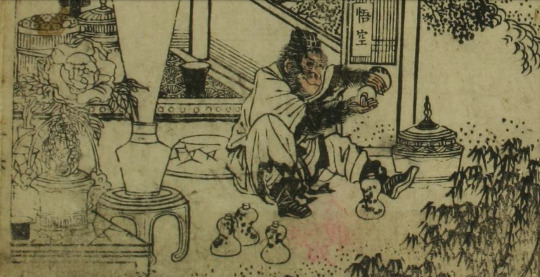
A detail from the 1835 Japanese translation of Journey to the West.
6) Ginseng Tree Fruit - Ch. 24
In the mountain there was a Daoist Abbey called the Five Villages Abbey [Wu zhuang guan, 五莊觀]; it was the abode of an immortal whose Daoist style [name] was Master Shenyuan [Shenyuan zi, 鎮元子] and whose nickname was Lord, Equal to Earth [Shi tong jun, 世同君]. There was, moreover, a strange treasure grown in this temple, a spiritual root that was formed just after chaos had been parted and the nebula had been established prior to the division of Heave and Earth. Throughout the four great continents of the world, it could be found in only the Five Villages Abbey in the West Aparagodaniya Continent. This treasure was called grass of the reverted cinnabar [cao huan dan, 草還丹], or the ginseng fruit [renshen guo, 人參果]. It took three thousand years for the plant to bloom, another three thousand years to bear fruit, and still another three thousand years before they ripened. All in all, it would be nearly ten thousand years before they could be eaten, and even after such a long time, there would be only thirty such fruits. The shape of the fruit was exactly that of a newborn infant not yet three days old, complete with the four limbs and the five senses. If a man had the good fortune of even smelling the fruit, he would live for three hundred and sixty years; if he ate one he would reach his forty-seven thousandth year.
[After Wukong learns the complicated method of harvesting the fruit] Parting the leaves and branches, he knocked three of the fruits into the sack ... The three of them [Monkey and his brothers] took the fruits and began to enjoy them (Wu & Yu, 2012, vol. 1, pp. 453 and 462-463).
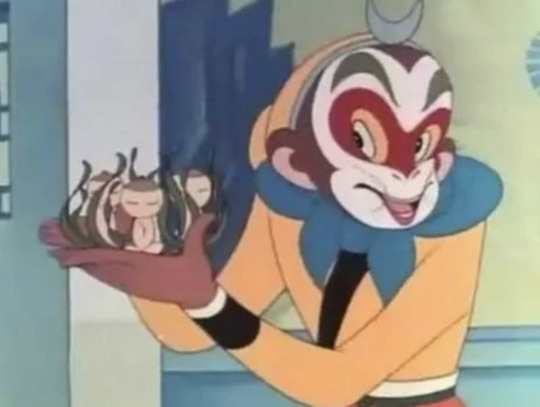
Monkey holding ginseng tree fruit. Image found online.
This previous article talks about the history of this magical fruit.
An important note
Sun Wukong is not really immortal, just long-lived and hard to kill. Immortality in Ming to Qing-era popular literature means that you can live for a long time but still die if injured badly enough. Think of it like an infinitely long candle being blown out instead of having a chance to burn for centuries or eons. For example, Investiture of the Gods (Fengshen yanyi, 封神演義, c. 1620), a sort of prequel to Journey to the West, is full of immortals killed in battle with heavenly weapons. Some even have their immortality sapped away before dying in one of many celestial traps. The biggest of these traps is the "Ten Thousand Immortal Array" (Wanxian zhen, 萬仙陣), so named because it can apparently kill myriad transcendents.
I commonly suggest that Monkey's levels of immortality just make him more durable than your average celestial.
Source:
Wu, C., & Yu, A. C. (2012). The Journey to the West (Vols. 1-4) (Rev. ed.). Chicago, Illinois: University of Chicago Press.
#sun wukong#monkey king#journey to the west#Chinese immortal#immortality#Chinese literature#Daoism#Taoism#Buddhism#fengshen yanyi#elixir#lego monkie kid#LMK
151 notes
·
View notes
Text
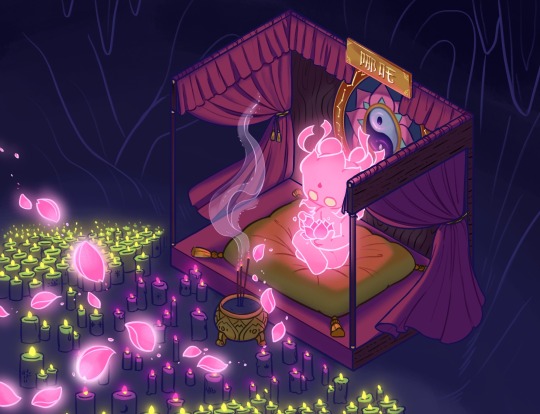
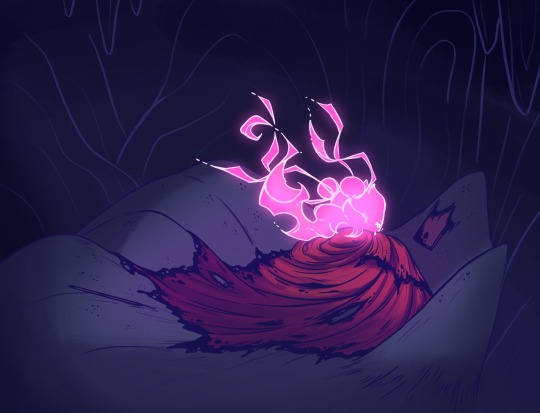
First altar 🕯
#my art#nezha#third lotus prince#prince nezha#fengshen yanyi#FSYY#investiture of the gods#everytime I look at the second picture I somehow think of amethyst from su#illurstration
843 notes
·
View notes
Text
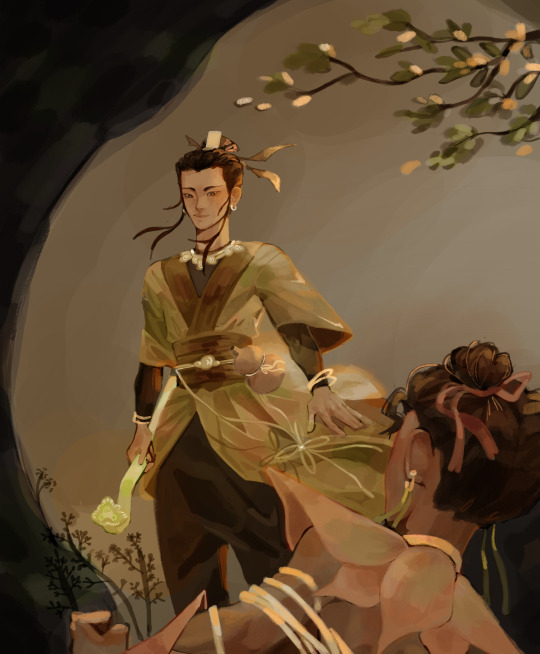
金吒领师命
#jinzha#nezha#investiture of the gods#fengshen yanyi#fsyy#art tag#li sibling violence.. part 2!!#srry idk why he's smiling#li jinzha is interesting 2 me i feel like i always picture him as the literal golden child#childhood prodigy with the will and the capability but no real will to step out of the box#like u know people who are good at everything but seem to lack personal motivation outside of what's expected of them..#not that he's not content..
154 notes
·
View notes
Note
Are there more stories about what demons Erlang has faced? Or more stories about him or where his character is included? I'm aware of Journey to the West, fsyy, the story with his mother and Lotus Lantern, but I was wondering if there were other stories where his character appears.
There are a lot of stories with him but they are more like legends than like narrative tales so to speak. Xiyouji, FSYY, and Lotus Lantern are novels and plays that allow full narratives that Erlang Shen features in but none really show the full extent of his character as he is more of a feature character than ever the protagonist.
Erlang's control of water is Erlang Shen's first and greatest achievement was water control and water control and made him a famous water god. With Erlang God's water control as the core, it radiates into legends such as killing dragons and slaying dragons.
Carrying mountains to catch the sun was from the Kaixi Period of the Song Dynasty, the "Inscription of the Induction of King Zhaohui Lingxian" describes the Erlang Shen as "the majesty of disturbing the mountain to take advantage of the sun, and the bravery of crossing the sea to capture the dragon.
The legend of Erlang Shen leading his divine soldiers and generals to search the mountains and succumb to demons can be found in the volume "Searching the Mountains", also known as the "Erlang Shen Searching the Mountains".
In the Five Dynasties, there is a legend about Erlang capturing an evil dragon. "Shu Shu": "The New Year's Banquet in June, "Guankou Divine Team" by Jiaofang Haiyu. The image of the two dragons fighting, the sky and the earth were dark for a moment, and there was heavy rain and hail. The Qing Dynasty's "Sichuan General Chronicle" locks the dragon: " It is said that Erlang locked the evil dragon in it. When frost falls and water falls, you may sometimes see it locked in the clouds."
In the Song Dynasty, there were a lot of themes of Erlang killing dragons. The Erlang who spent money usually rode an eagle and followed the dog. The entourage held a bow and stood a three-pointed two-edged sword beside him to subdue the dragon or the dragon transformed into a human body.
In the early days, Erlang Shen's divinity mainly came from Li Bing, who controlled floods. Guankou Erlang Shen controlled wind and rain, and Li Erlang's main deeds were also to capture dragons and control floods.
The "Stele Record of the Divine Blessing King" written by Zhou Hu of the Southern Song Dynasty (1170-1231) records that in 1206 AD, that is, the second year of Kaixi, Erlang Shen helped him fight against the Jin Dynasty and achieved a major turning point. Therefore, Emperor Ningzong of the Song Dynasty named Erlang Shen "Saint Martyr Zhaohui to protect the country".
As the belief in Erlang Shen spread widely, the priesthood of Erlang Shen also expanded as he was seen as a protector of the country's spirit. The "Nangong County Chronicle" of the Republic of China quoted Lu Zhongfu from Jin Zhangzong as saying: "In the autumn of the fifth year of Zhenglong (1160), the giant locusts covered the sky and ate all the acres. There were reports of hunger everywhere, the price of grain soared, and county people rushed to pray at the temple of Erlang Shen. The locusts dispersed and did not stay in the area. Fortunately, they were harmless at this time."
Erlang Shen is not only a god with vast supernatural powers and remarkable spiritual responses, but he was also regarded as the god of drama in the Ming Dynasty and was worshiped by Liyuan.
The Cuju industry also respects Erlang as the god of the industry and follows his character of playing games in the world.
Erlang God was revered as the "Lord of Sichuan" and became the god who protected the people of Sichuan from living and working in peace and contentment.
Song Zhang Tangying's " Sichuan Prayer " records: "(Qiande) in the second year of August, (Wang) Yan patrolled the north, and Prime Minister Wang Kai judged the guards of the six armies. The banners and flags were inexhaustible for hundreds of miles. Yan's military uniforms, Wearing golden armor, a beaded hat, and brocade sleeves, he holds a bow and carries an arrow. The people look at him and say he is like a 'guan-kou god'." Erlang Shen is equipped with a hound, an eagle, and a slingshot. It is a standard image of the hunting god, capable of restraining birds, beasts, mountain spirits, and wild monsters.
Because Erlang Shen carried a slingshot, he was attached to the function of delivering children by later generations. Because the slingshot is homophonic with "birth", it means birth. Almost every Erlang temple has people seeking children, which is the basic priesthood of Erlang Shen.
Tianqi was built in southern Fujian during the Chongzhen period of the Fengshan Ancestral Temple in the Ming Dynasty, the belief in Erlang Shen has formed a water god worship with strong local characteristics of southern Fujian in southern Fujian. There are now three statues in the Fengshan Ancestral Temple, which are called "Ambassador", "Second Ambassador" and "Third Ambassador", and "Ambassador" is the Erlang Shen in people's minds
I'm taking this all from his page so if you want a more detailed explanation I would suggest looking it into yourself because there is SO MUCH information about Erlang Shen being such a well-known figure and hero of legend that no way I can fit it all in one post but I hope this gives people an idea just how grand Erlang Shen's legend is and just how rich in both history and lore he is!
#jttw#journey to the west#xiyouji#ask#erlang shen#yang jian#sun wukong#lotus lantern#fengshen yanyi#fsyy#investiture of the gods#romance of the gods
32 notes
·
View notes
Text
"Ruthlessness" from Epic the Musical, but with Ao Guang as Posideon singing to Nezha after the child had permanently disabled/killed his son Ao Bing.
#chinese mythology#ao guang#nezha#ao bing#investiture of the gods#fengshen yanyi#journey the west#lego monkie kid#jttw#lmk
35 notes
·
View notes
Text
Many thanks to @journeytothewestresearch for collecting the four volumes of Fengshen Yanyi into a free to access archive, translated by Gu Zhizhong. It is not perfect and transliterates names. But it is the only complete English translation. Read here:
#chinese mythology#fengshen yanyi#investiture of the gods#canonization of the gods#creation of the gods#chinese folklore
103 notes
·
View notes
Text
Into the Erlang-verse: Li, Zhao, Yang
-This is something I wrote for fun and reference purposes, back when I was starting to seriously get into Chinese mythology. As such, there is no citations, and is meant to be more of a general introduction to Erlang Shen in pre-modern writings.
(Emphasis on "pre-modern", because, as much as I love the Lotus Lantern + Prequel TV series, it's just a little frustrating to see people taking the shows' version as the end-all-be-all of such a complicated deity, y'know?)
-Anyways, much like Nezha, his Archery Accident Bro, Erlang has what I'd refer to as his "Pop Culture Form": Handsome three-eyed warrior god wielding a three-pronged spear, accompanied by his doggo Xiaotian Quan(Literally "Skyhowler"), going by the surname "Yang", jade emperor's nephew, etc.
-However, The Second Lad is an even messier amalgamation of deities worshiped in different parts of China, even in his supposed "home domain", Sichuan. Here, I'm only gonna talk about the most well-known and significant Erlangs.
(Not even gonna go into the possible Zoroastrian influences and the Dujian thing...)
1. Lord of Sichuan, "Li Erlang"
Key words: Hydraulic engineer, based on a historical official and his son, fierce competitor with Zhao Erlang for the Lord of Sichuan title
Weapons: Knowledge
Power: Can turn into a bull/dragon
Pets: N/A
"Who's Yang Jian? I've been watching over Sichuan since the Qin dynasty."
Li Bing was a pretty typical case of famous historical figure being worshiped as gods posthumously; born in the Warring States era, this official was put in charge of the Shu Prefecture (modern Chengdu) by King Zhao of Qin, and he was known as the creator of Dujiang Yan, an ancient irrigation + flood control project.
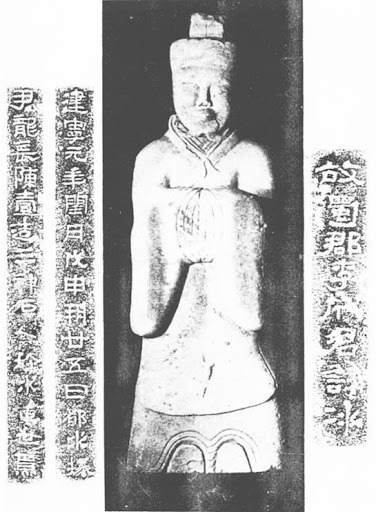
Later Tang legends deified him with a bunch of traditional "Flood-control hero" tropes taken from Yu the Great (heads up JTTW readers, SWK's staff is originally his extendable ruler), mostly the "hero turn into a giant animal" and "fight and subdue local water demons" aspect.
Though he wasn't yet known as an Erlang, or gained a son called Erlang as later folklore would have it, Li Bing's worship began in the Eastern Han dynasty, and he had a long tradition as Sichuan's guardian deity.
Even as later versions of Erlang began to populate, in the Qing dynasty, people of the province were still like "Our Lord of Sichuan is Li Bing/Li Erlang, not Yang Jian, as the novels would have you believe!"
What made Li Bing and his likely nonexistent son into "Li Erlang" could be traced to the two "warlord states" that occupied Sichuan after the fall of Tang dynasty: both states tried to use the Lord of Sichuan worship to strengthen their own legitimacy, and passed decrees that 1) said Erlang was Li Bing's son and 2) granted both father and son honorable titles, as mentioned in Song dynasty records.
However, due to the association of Erlang with previous warlord states, the first emperor of Song had reassigned Li Bing a lesser title and taken away his son's title altogether, reducing him to just "God of Guankou", and worshippers were quite disgruntled by the change; there was even a rebellion using the Guankou worship rituals to legitimize itself, a decade after said emperor's death.
Fun fact: when I went to the Two Lord’s Temple (of Li Bing and Li Erlang) in Dujiangyan, even though the god worshipped in the main hall was supposed to be Li Erlang, the plaque next to it still said something like "Li Erlang, also known as Yang Jian"...
Which really shows just how influential FSYY is on popular worship, to the point of overshadowing older incarnations of certain deities.
2. Immortal Master of Illustrious Sagacity, "Zhao Erlang"
Key words: Chief of Jiazhou Prefecture, dragon slayer, No.2 violator of archery safety (first place goes to Nezha)
Weapons: A scribing tablet, slingshot, sword, bow and arrows
Power: Supernatural strength, monstrous giant form
Pets: unnamed white horse, hunting hawks and hounds
"C'mon, my aim isn't that bad! What happened in the Zaju was a one-time thing!"
The prototypical Taoist Erlang, his name, "Zhao Yu"(赵昱) first appeared in a Song dynasty source. At this point, the story of Erlang was mainly defined by two traits: 1) was, or was related to an official in charge of Sichuan in bygone times and 2) Did heroic flood control stuff, probably through dragon-slaying.
One notable strand of local worship was the "God of Guankou"; historical records mentioned that people sacrificed hundreds and hundreds of goats to him, as well as a regional festival in Sichuan where people played out his confrontation with dragons. It coexisted and entwined with the "Lord of Sichuan" worship, until the Song dynasty.
In typical Song dynasty fashion, the officials decided to give their own official title to this...Erlang/Lord of Sichuan/God of Guankou guy, bringing our titular "Zhao Erlang" into existence.
Also a deified official from the Tang dynasty, his image was more heavily influenced by Taoism (historically popular in Sichuan) and centered around one of its holy places, Mt. Qingcheng, which just happened to be quite close to Dujiang Yan.
Though in the Northern Song dynasty, the state-recognized Erlang was still "Li Erlang", the Taoist Zhao Erlang had proven himself to be a strong competitor by the Southern Song and Yuan dynasty, thanks to a massive amount of opera plays.
First we have SJSSDQ (三教搜神大全, Yuan Dynasty), an encyclopedia of Buddhist, Taoist and Confucian gods, where his traditional backstory as an ascended mortal official was combined with the dragon-slaying feat to nudge Erlang toward a more warrior-esque image, a hunting god who appeared on a white horse with his entourage of hunters.

-We also got the first mention of what would become his six/seven sworn brothers; the "Seven Sages" who jumped into the water to assist him in the dragon fight.
Then we have two Yuan-Ming Zaju plays, "Erlang of Guankou Slays the Jian-jiao"(灌口二郎斩健蛟) and "Erlang Drunkenly Shot the Demon-locking Mirror" (二郎神醉射锁魔镜), in which many traits associated with JTTW's Yang Erlang could already be seen: first, his three-pronged weapon, seven brothers and bow/arrows, second, the naming of his brothers as the "Seven Sages of Mt. Mei" and his ability to shift into a "true form", aka the monstrous giant form he used in JTTW.
(The plot of the second Zaju is exactly like it sounds: Erlang and Nezha had a drunken archery competition, accidentally broke the Demon-locking Mirror and released the Bull Demon King + Hundred-Eyed Demon, and spent the rest of the play doing damage control.)
3. The Little Sage, "Yang Erlang" (JTTW)
Key words: Jade Emperor's nephew, cleaver of Peach Mountain, SWK's true equal in battle
Weapons: Three-pronged, Double-bladed Spear, slingshot, bow and arrows, axe
Power: transformations, Cosmic Body, divine sight/Phoenix Eye(?)
Pets: a celestial Xiquan, literally "Thin Dog"
"First time we met, and that monkey made fun of my origins as a conversation opener. Could you believe it."
The Man, The Myth, The Legend! As I said before, a lot of his traits were inherited from "Zhao Erlang", including his Taoist title, his temple at Guankou, etc.
However, Erlang being Jade Emperor's nephew seemed to be mostly popularized by JTTW: the only other work that might have given Erlang this backstory was The Precious Scroll of Erlang, previously dated to the 1560s, though a Chinese paper published in 2018 proposed a later creation date (1620s).
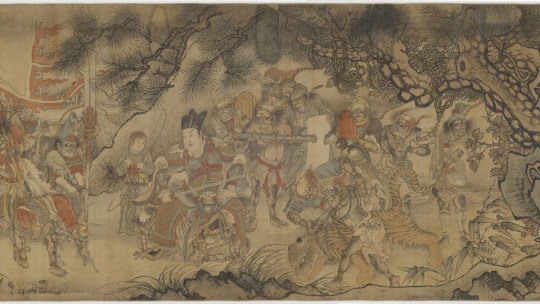
Much like JTTW Nezha, his backstory was somewhat barebones: we knew from SWK's taunt that his mother was the Jade Emperor's sister, who got chummy with Yang the mortal, gave birth to him, and was presumably locked under the Peach Mountain for that, bc Erlang then rescued her by cleaving it in half with an ax.
(Sounds familiar? The same backstory would later be copied over to Erlang's nephew, in the Lotus Lantern legends)
His other notable feats include falling 2 phoenix with his slingshot, as well as slaying the "Seven Demons of Mt. Mei ''. Out of pride, he chose to remain in Guankou instead of associating with his heavenly relatives, and did not answer to general summons to court from the Jade Emperor, only taking special assignments (听调不听宣).
Apart from his famous fight with SWK, Erlang also appeared in JTTW chapter 63, where, together with his sworn brothers, he helped the pilgrims fight the Nine-Headed Wyrm, son-in-law of Bibo Lake's dragon king. His dog continues to be the MVP in this fight, biting off one of the demon's heads, leaving it wounded and fleeing toward the north sea.
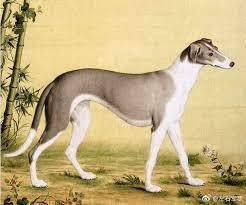
Though the description of his battle with SWK implied that he did have some sort of supernatural sight, at this point in time (Ming dynasty), Erlang wasn't yet depicted with a third eye in artworks and literature.
There are a small amount of evidence that suggest the third eye thing might have shown up in statues of this period, though.
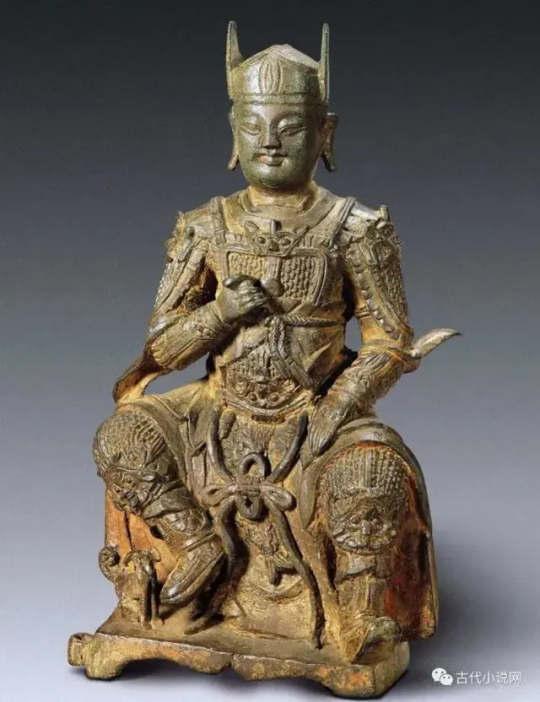
4. Master of the Ninefold Mystic Way, "Yang Jian" (FSYY)
Key words: Disciple of the Taoist sage Yuding, veteran of the Investiture War, Nezha's comrade-in-arms
Weapons: Three-pronged Spear, slingshot
Power: Ninefold Mystic Way, 72 transformations, invulnerable to physical attacks, Samadhi Fire (in FSYY it's on the same level as a D&D wizard's Fireball spell)
Pets: Howling Celestial Dog, unnamed white horse
"I fought a transforming monkey demon too!"
Fun fact: the guy whose name was most often taken as Erlang's "real name" by pop culture was never actually referred to as "Erlang" in his debut novel. Could ya believe it.
Quick, dirty summary of FSYY: kinda like the Chinese Iliad, about the overthrowing of Shang dynasty and its tyrannical King Zhou by King Wu of Zhou, with a dash of Taoist infightings, and almost everyone who died in the fight got revived as gods and became part of the celestial bureaucracy, thus "Investiture of the Gods".
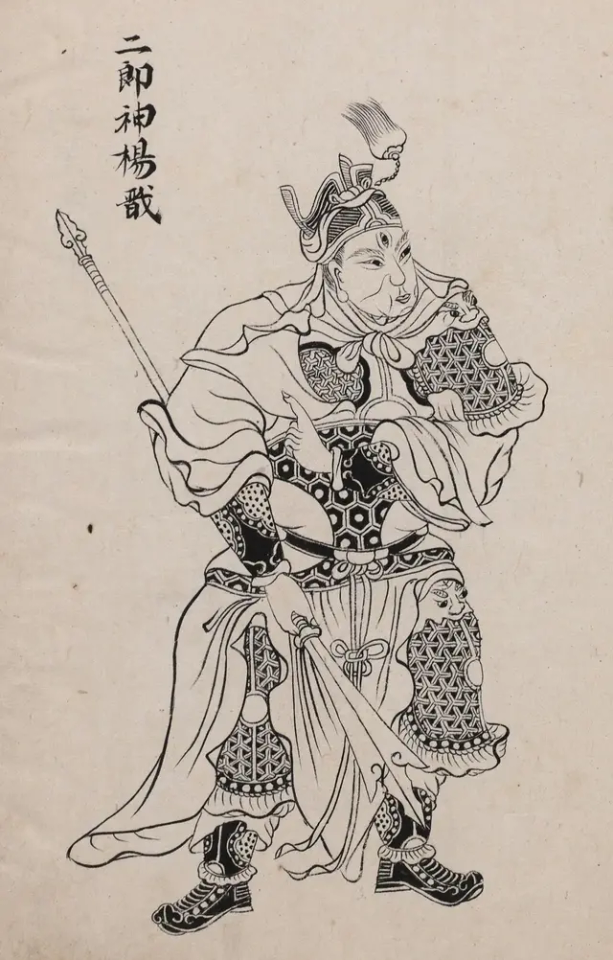
Under the order of his master, the Taoist sage Yuding (literally "jade tripod"), Yang Jian makes his first cameo in chapter 40 to assist his senior, Jiang Ziya, in the fight against the Four Generals of Clan Mo.
A master in the arts of the Ninefold Mystic Way and 72 transformations, he has the same divine title as Zhao Erlang and is considered "A Sage in Flesh" after the end of FSYY.
As such, he's able to survive getting eaten by a monstrous weasel, a metal whip in the forehead, graphic disembowelment, etc. and used his transformation skills for some SWK-style "beating people up from inside their stomachs".
On one very notable occasion, he transformed into a beautiful palace consort to dupe Tu Xingsun ("Earth-traveling Son") and capture him.
Oh, and also, on his way to get Tu Xingsun's master, he ran into this random demon in a lake, who led him into a cave. After he got inside, the demon just disappeared, leaving him with the Three-pronged Two-bladed Spear, as well as some nice bling.
Then two kids burst in, accused him of stealing the bling, and...instantly became his students after learning his name? Yeah that was a weird sidequest.
However, Yang Jian's most iconic battle is probably his fight with Yuan Hong, the White Ape of Plum Mountain...who also practiced the Ninefold Mystics, used an iron cudgel, and were sworn brothers with six/seven demon kings.
Only with the help of Nvwa's magical painting, the Shanhe Sheji Scroll, was Yang Jian able to capture the ape, and subsequently, let Jiang Ziya decapitate him with Sage Luya's Immortal Slaying Flying Knife.
When the Three Demonesses were caught and executed at the end of the book, he was the one responsible for slaying the Nine-headed Pheasant Demoness, which is a neat parallel with JTTW.
His Howling Celestial Dog appears in chapter 47, and is even more of an MVP in fights: 12 immortals and demons have been bitten by this dog, which was "as large as a white elephant and as swift as an owl".
Funnily enough, every time Yang Jian summoned his hound, it is described in the same way as, say, other immortals may summon a flying sword, and my mental image is just him yeeting his giant monster dog at the enemy like you'd throw a Pokeball.
(A list of everyone Xiaotian had bitten in FSYY: Zhao Gongming, his sister Bixiao, Xinhuan, Deng Chanyu, Zhou Xin, Hua Huan, the Winged Immortal, Yuyan, Lv Yue, Yu Hualong, Dai Li the dog demon, the Nine-headed Pheasant Demon.)
Conclusion:
-The way I see it: Li is the Erlang of regional worship, Zhao is the Erlang of Zaju plays, and Yang is the Erlang of vernacular novels, who becomes super popular and overshadows his two predecessors.
-And Erlang's depiction in premodern Lotus Lantern tales is what we in the business call "a whole new can of worms". But that's a series for another day.
#erlang shen#chinese mythology#chinese folklore#journey to the west#investiture of the gods#fengshen yanyi#xiyouji#yang jian
18 notes
·
View notes
Text

• WIP for accademy project (etching) •
#nezha#china#chinese mythology#dragon#chinese dragon#fengshen yanyi#investiture of the gods#ao bing#art#artist#digital art#traditional art#etching#wip#draw#drawing#illustration
47 notes
·
View notes
Text

Birth at four in the morning
"Sword in hand, Li Jing rushed into the bed chamber. There he found the chamber full of red light and fragance and saw a fleshy ball rolling to and fro near the bed. Shocked at the sight, he moved forward and struck the fleshy ball with his sharp sword. As it split in two, a baby boy jumped out amidst the red light. He had a white, beautiful face, wore a gold bracelet on his right wrist, and his belly was covered with a piece of red damask silk that shone with golden light."
we interrupt the scheduled JTTW content for a bit of FSYY, cus this portion of it haunts me, and i think we can always make things more gruesome and messy :D
in case anyone was wondering why this blog is +21, this is why <3
CW: BLOOD, GORE, BIRTH IMAGERY
#li nezha#third lotus prince#thrid prince nezha#fengshen yanyi#investiture of the gods#bell dragon art#cw blood#cw gore#cw birth imagery
91 notes
·
View notes
Text
Bad FSYY English translation
The four-volume Library of Chinese Classics bilingual edition of Creation/Investiture of the Gods (Fengshen yanyi, c. 1620) published in 2000 is the only full-length translation of the story available in English. I've had a PDF of the entire set archived on my external blog since May of 2020. It is serviceable for the general reader, but it is not great for hobbyist researchers like myself.
I'd like to provide an example showing how it is not very accurate and/or comprehensive. Chapter 12 describes how young Nezha inadvertently causes havoc in the underwater realm when washing himself in a river with a powerful magic sash. This eventually leads to Li Gen (李艮), a yaksha water-spirit soldier, to attack him with an ax. Gu Zhizhong's (2000) translation reads:
Nezha, naked and empty-handed, dodged the vicious blow, raised his Universal Ring and struck Li Gen on the head. How could the Yaksha withstand the magic weapon from Fairy Primordial! His skull broke open and he fell dead on the river bank (Gu, 2000, vol. 1, p. 239).
However, the full Chinese reads:
Standing there naked, Nezha dodged the advancing warrior's attack and upraised the Universal Ring in his right hand. This treasure was originally bestowed by the Jade Emptiness Palace of Mt. Kunlun to the Perfected Man of the Grand Monad to secure the items of his Golden Light Cave. How could the yaksha withstand the magic weapon as it struck downward on his head? His brains exploded from the blow, and he fell dead on the shore.
哪吒正赤身站立,見夜叉來得勇猛,將身躲過,把右手套的乾坤圈望空中一舉。此寶原係崑崙山玉虛宮所賜太乙真人鎮金光洞之物,夜叉那裏經得起,那寶打將下來,正落在夜叉頭上,只打的腦漿迸流,即死於岸上。
(I don't consider myself a translator, so please forgive any errors.)
You can see that quite a bit of information was left out. This happens throughout the entire novel. This makes me angrier the more that I think about. Why even bother to translate something if you are only going to paraphrase or even skip over passages? It seems like a pointless enterprise.
Source:
Gu, Z. (2000). Creation of the Gods (Vols. 1-4). Beijing: New World Press.
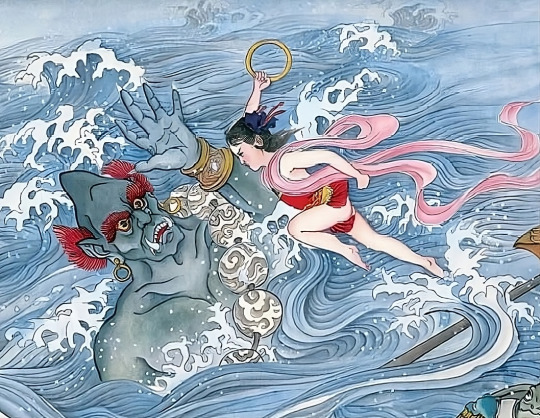
#Creation of the Gods#Investiture of the Gods#Fengshen yanyi#FSYY#English translation#bilingual#Nezha#Third Prince#Lotus Prince
51 notes
·
View notes
Text
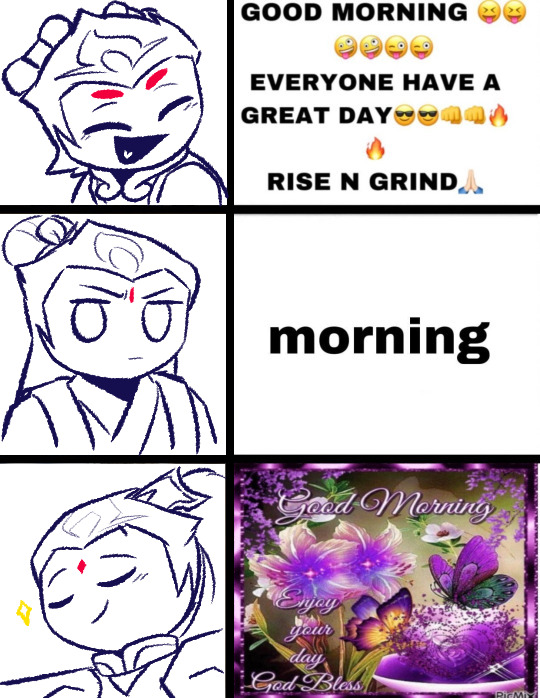
Not very lmk related but still
#my art#shitpost#nezha#lego monkie kid#lmk#lego#monkie kid#way to say good morning#meme#muzha#jinzha#it’s been a while since I last drew his brothers they’re silly#Fengshen Yanyi#investiture of the gods
546 notes
·
View notes
Text
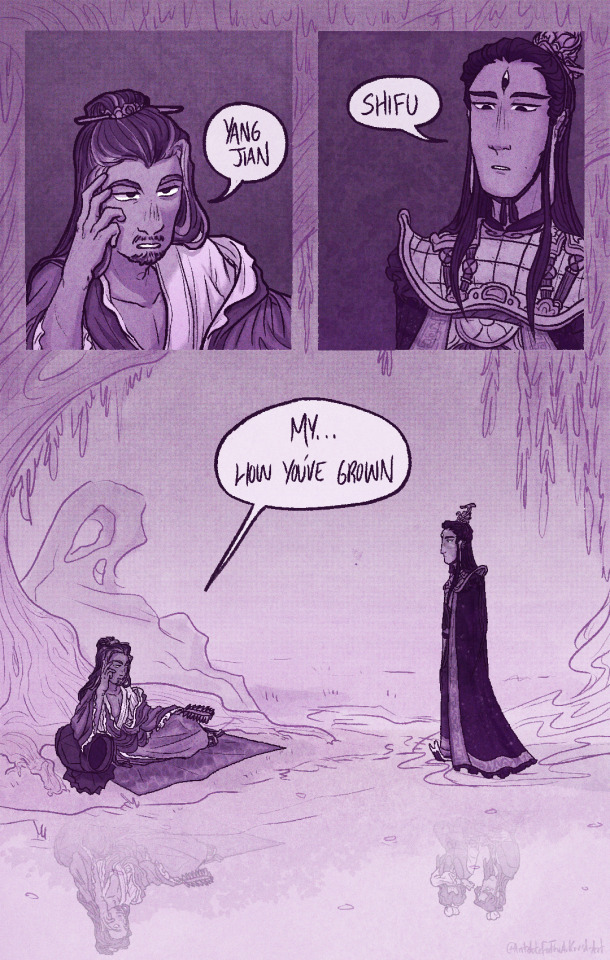
One must wonder how Yuding Zhenren feels during the events of Lotus Lantern...
[ID: A monochrome purple comic. In the first panel is Yuding Zhenren from the shoulders up, resting his head on his hand while reclining and looking up with a cold, angry expression, saying "Yang Jian." In the second panel is Erlang Shen from the shoulders up, looking down at Yuding Zhenren with a detached expression, responding "Shifu." The third panel zooms out to show Yuding Zhenren reclining on a mat while looking up at Erlang Shen, who is standing a few feet away. Yuding Zhenren says, "My... How you've grown." Yuding Zhenren and Erlang Shen both cast reflections on the pond beside them. While Yuding Zhenren's reflection looks largely unchanged, where Erlang's reflection should be, are the image of him and his sister as kids, crying and kneeling in front of Yuding Zhenren. End ID]
#my art#lotus lantern#investiture of the gods#fengshen yanyi#chinese mythology#erlang shen#yang jian#yuding zhenren#oguhjhgdjfkdfk not entirely satisfied with how this looks but i think i am rusty#'yang jian- i went gray over you and your sister. do you know how hard it is to start greying when youre of my cultivation level.'#yuding zhenren definitely didnt disown or banish erlang shen bc heavenly politics and bc he's still attached to erlang#but#ough things were definitely different between them after erlang shen sealed sansheng mu away#'你还有脸认我这师父?you still have the face to recognize me as your shifu?' type vibes#also i love the idea of messy brash swk having the most uptight dignified sifu while the put-together erlang has a messy shifu#yuding zhenren's design partially inspired by huang yaoshi of condor heroes (2011) but mostly just the general 'drunken immortal' aesthetic#also this is purposefully paralleling the dialogue i did for that swk puti reconciliation comic <3 bc foils <3#patriarch puti was cold and detached when he banished swk but i think yuding zhenren would throw shit at erlang and yell '你疯了吗!?'
210 notes
·
View notes
Text
Hoshin Engi spreadsheet!
So I don't know how many people who follow me have ever read Ryu Fujisaki's manga Hoshin Engi, but it's a really fun story and I decided to compile a spreadsheet of Chinese pronunciations.
Many thanks to @kaibutsushidousha for getting me into the manga with his posts and helping me with the compilation. He's a cool dude! Check him out some more!
12 notes
·
View notes
Note
who were Nezha's brothers, also why did he try to kill his father?
Nezha has two brothers Muzha and Jinzha, and a sister Zhenying, as well as an adopted sister Lady Earth Flow.
Muzha who we actually see quite a bit in Xiyouji as he is GuanYin's disciple, whom she often takes with him on her outings and fights by her side. He did most of his work in the first few chapters fighting Bajie and Wujing but he plays as more of a message for the rest of the series, making people forget about him a bit. He was also in Fengshen Yanyi though I haven't gotten around to reading that yet.
And Jinzha who honestly I know less about since I still have not read Fengshen Yanyi despite being watching the 2003 Nezha series. He is the disciple of Wenshu Guangfa Tianzun.
King Li tried to kill Nezha when he was born, not because he hated Nenzha but because he was not born a baby. He was born a ball of flesh, and they thought he was a Demon. Until the flesh ball was cut and out came a new three old baby boy! But even then Nezha was the one to give his life for his family after he ripped out Ao Bing's spine, and his entire village was in danger of being drowned, he took his own life. But while his mother Madam Yin made a temple for Nezha that was worshipped, King Li found out about it and burned it because he was still upset at Nezha for putting them at odds with the heavens in the first place. When Nezha was brought back to life he did a "Nezha will remember that for later" and certainly didn't forget that his father burnt his temple down. Nezha went to confront his father and fight him but Muzha stood in his father's place as King Li ran away. And Nezha did end up accidentally killing Muzha hi throwing a gold brick at him… he came out fine! I think... still need to read up. I mean he’s alive now, so you know probably got better. The family relationships are very strange in this. King li have two kids that got dead and both are traumatized and very good at fighting
#anon ask#jttw#journey to the west#xiyouji#Investiture of the Gods#Fengshen Yanyi#li nezha#nezha#li muzha#muzha#jinzha#li jinzha#ask
55 notes
·
View notes
Note
The idea of Monkie kid Nezha being (technically, I know) the Jade Emperor’s grandson is hilarious to me because it opens up the idea for two dynamics.
“I hate you because you are the walking representation of the marriage my daughter betrayed me to have.”
Or
“Your mother’s a bitch but we’re cool.”
It's... complicated.
You see, after the situation with Zhinu and Songzi/Guanyin happened, Second Princess Yin Wuming had been one of the many imperial princesses that had silently opposed her parents punishments against their own children. Upon losing both her eldest and (then) younges sisters to their poor parenting; she had enough. She was a second born who decided once and for all to scream her opinion into the world, no matter the consequences.
As a punishment for her insolence; the Jade Emperor and Queen Mother sent Yin to live a mortal life on earth until she could understand the suffering a mortal life can bring.
Yin responded to this reincarnation by becoming a demon hunter, marrying a cool af fellow hunter, and having 2 half-divine children before her parents realised that they had made a terrible mistake.
Refusing to yield on their negative opinion of human-celestial relations, but not wanting to lose another daughter as they had Zhinu, the Queen Mother cursed Yin to be unable to bear a child without great suffering. Similar to what she would do to Princess Iron Fan many years later.
What the Queen Mother hadn't counted on though... was that Yin was already pregnant with her third child...
Nezha absorbed the infernal magic sent by his grandmother, and became well... Nezha. Wreathed in flames and more demon than child.
The Jade Emperor and Queen Mother looked down, saw this little guy and were like; "Uh oh."
After the whole storyline involving the war with the dragons, Nezha's sacrifice and rebirth, the Investiture Crisis, Li Jing's and his sons rise to godhood, and Lady Yin refusing reascension to continue the cycle of reincarnation?
The Jade Emperor and Queen Mother basically see Nezha as a painfull reminder and a trophy all at once.
Nezha is the sum of their victories in the Investiture Crisis. Holding a blessing from the Pure One themselves in his rebirth. Raised in his new life to become a fine heavenly soldier and valuable asset to the Celestial Realm.
But he's also a reminder of the wrongs the royal couple have done. They were indirectly responsibile for his creation, and the suffering he brought upon the gods, mortals, and dragons alike. And even with their grandsons and son-in-law becoming celestials, they still lost another one of their daughters.
Nezha is both their most trusted advisor and most detested grandchild.
Lady Yin's soul is still in the cycle of rebirth, so there's no way to know where she's at rn.
#lmk nezha#lmk aus#lmk jade emperor#lmk xiwangmu#lmk queen mother of the west#nezha#the jade emperor#the queen mother of the west#xiwangmu#lady yin#investiture of the gods#fengshen yanyi#lego monkie kid#lmk#the monkey king and the infant#the monkey king and the infant au#chinese mythology
37 notes
·
View notes